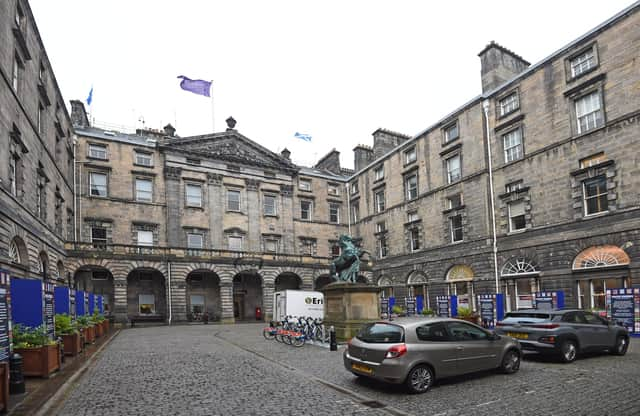Why councillors are not politicians – Helen Martin


TWITTER isn’t always a source of agreement. We all have different opinions. But in a reply to Glasgow Councillor Elspeth Kerr, I suggested that I believed local authority councillors should not be declared or labelled as political party members.
She agreed, then trails of “likers” and “retweeters” followed, including one saying “once independence is achieved, Scottish councils should be non-political”.
Advertisement
Hide AdAdvertisement
Hide AdCouncils do function like little parliaments. But for the population, that doesn’t make sense. Or does it?
They have a lot to deal with such as refuse collection, schools, planning, public transport, speed limits, having landlords registered, setting and collecting council tax, social work, street lighting, road design, recycling depots and dumps, public parks, council housing, libraries, CCTV, primary health care, some care homes and home care, part-funding for elderly residents, licencing of severalbusinesses, and more. It’s a lot.
A council is a vital body that organises its area or city, its needs and services. Councillors have to get to know their ward, the people they represent and major local concerns. But it has nothing to do with national parties, apart from obeying government rules.
Where our local governance is affected is when councillors copy Parliament in the running of the council. There is a winning party or a strong coalition with another party. That not only reduces the chance of councillors in other parties sharing, explaining and winning with their views, it more or less wipes out the participation of independents.
Advertisement
Hide AdAdvertisement
Hide AdA leading party or coalition might have a specific desire and policy they want to introduce, which their members are under obligation to support.
Councillors, as members of a party, are not expected to challenge or oppose a policy if they personally don’t agree with it, let alone stand up for their electors if their area will suffer from a party rule.
Councils are not parliaments. Councillors are not politicians. They are a group of preferably local people who are there to represent the local public.
Yes, they have to manage the budget. They have to make important decisions that divide us. Hot topics are local subjects such as tourism vs over-tourism, blocking cars from shopping areas, the Christmas Market destruction, tram extension, public park re-function and so on. None of these relate to national politics.
Advertisement
Hide AdAdvertisement
Hide AdAn alternative would be councillors standing in an election as individuals. We could vote for them if we recognised their knowledge and experience of the area they stood for, ideally if that was their home area too. If they told us what jobs and careers they had been through and what qualifications they had, that would be useful to us and the council.
We would want a councillor who shares or understands and represents the ward’s situation whether that’s poor or affluent, city centre areas or quiet suburbs.
We could have some of the councillors we already have, but with no interest in their political vote and no allowance for party alliances.
Their backgrounds in terms of finance, law, construction, principles and experiences could help group them on committees. And they would all be entitled to individual votes.
Advertisement
Hide AdAdvertisement
Hide AdSurely people don’t want a mini-Westminster where, regardless of any other MPs and voters, the leading party Cabinet runs everything without challenge for years.
This is not about Edinburgh, run by an SNP and Labour coalition (who in national politics are totally opposed). Most councils have party coalitions. For some councillors, it’s not really about a ward or a city.
It’s about political loyalty and winning, to build a career path, and have their party approve their candidacy to become an MSP and/or an MP.
A message from the Editor:
Thank you for reading this article on our website. While I have your attention, I also have an important request to make of you.
Advertisement
Hide AdAdvertisement
Hide AdThe dramatic events of 2020 are having a major impact on many of our advertisers - and consequently the revenue we receive. We are now more reliant than ever on you taking out a digital subscription to support our journalism.
Subscribe to the Edinburgh Evening News online and enjoy unlimited access to trusted, fact-checked news and sport from Edinburgh and the Lothians. Visit www.edinburghnews.scotsman.com/subscriptions now to sign up.
By supporting us, we are able to support you in providing trusted, fact-checked content for this website.
Joy Yates
Editorial Director
Comment Guidelines
National World encourages reader discussion on our stories. User feedback, insights and back-and-forth exchanges add a rich layer of context to reporting. Please review our Community Guidelines before commenting.